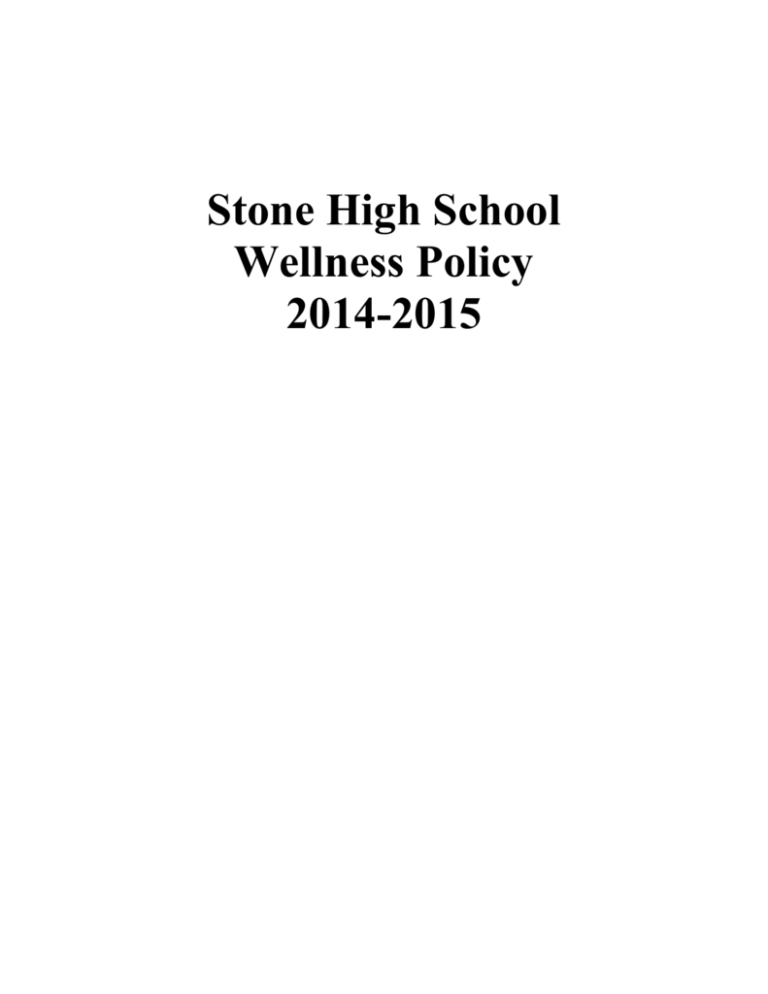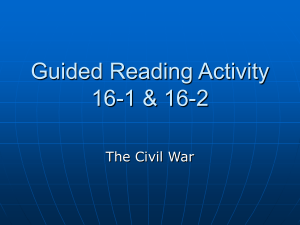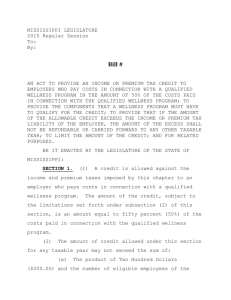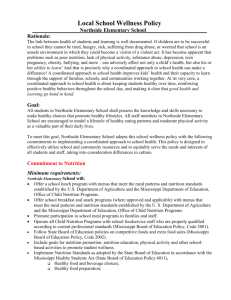mississippi buses
advertisement

Stone High School Wellness Policy 2014-2015 Local School Wellness Policy Rationale: The link between health of students and learning is well documented. If children are to be successful in school they cannot be tired, hungry, sick, suffering from drug abuse, or worried that school is an unsafe environment in which they could become a victim of a violent act. It has become apparent that problems such as poor nutrition, lack of physical activity, substance abuse, depression, teen pregnancy, obesity, bullying and more—can adversely affect not only a child’s health, but also his or her ability to learn! And that is precisely why a coordinated approach to school health can make a difference! A coordinated approach to school health improves kids’ health and their capacity to learn through the support of families, schools, and communities working together. At its very core, a coordinated approach to school health is about keeping students healthy over time, reinforcing positive healthy behaviors throughout the school day, and making it clear that good health and learning go hand in hand. Goal: All students in Stone High School shall possess the knowledge and skills necessary to make healthy choices and enjoyable physical activity choices that promote healthy lifestyles. All staff in Stone High School is encouraged to model healthful eating and physical activity as a valuable part of daily life. To meet this goal, Stone High School adopts this school wellness policy with the following commitments to implementing a coordinated approach to school health. This policy is designed to effectively utilize school and community resources and to equitably serve the needs and interests of all students and staff, taking into consideration differences in culture. Commitment to Nutrition Minimum requirements: Stone High School will: Offer a school lunch program with menus that meet the meal patterns and nutrition standards established by the U. S. Department of Agriculture and the Mississippi Department of Education, Office of Child Nutrition Programs. Offer school breakfast and snack programs (where approved and applicable) with menus that meet the meal patterns and nutrition standards established by the U. S. Department of Agriculture and the Mississippi Department of Education, Office of Child Nutrition Programs. Promote participation in school meal programs to families and staff. Operate all Child Nutrition Programs with school foodservice staff who are properly qualified according to current professional standards (Mississippi Board of Education Policy, Code EE-2E). Follow State Board of Education policies on competitive foods and extra food sales (Mississippi Board of Education Policy, Code EEH). Implement Nutrition Standards as adopted by the State Board of Education in accordance with the Mississippi Healthy Students Act (State Board of Education Policy 4011), www.healthyschoolsms.org/MSHealthyStudentsAct.htm . Develop a food safety education plan for all staff and students, consistent with Fight Bac® (www.fightbac.org) and other national standards for safe food handling at home and in school. All school personnel (school board members, administrators, teachers, school nurses, instructional and health services paraprofessionals, foodservice staff, custodians and facilities managers, and administrative support staff) will receive copies of the Local School Wellness Policy to include food safety policies and procedures and relevant professional development. Adequate access to handwashing facilities and supplies will be available whenever and wherever students, staff, and families prepare, handle, or consume food. The food safety assurance plan must address strategies that minimize risks for students and staff who have food allergies and intolerances. Provide parents, caregivers, vendors and any other community members who provide or are likely to provide foods prepared for consumption at school events with appropriate information about safe food preparation and storage. Commitment to Physical Activity/Physical Education Minimum requirements: Stone High School will: Provide 150 minutes per week of activity-based instruction for all students in grade K-8 (in accordance with Section 37-13-134, Mississippi Code of 1972, ann., reference 2004 Mississippi Public Schools Accountability Standards 32, Appendix B and 33). Kindergarten students will participate in physical activity for a minimum of 40 minutes per school day. The 40 minutes does not have to take place continuously. This time should be used to help the child increase the skills involved in physical coordination (Kindergarten Guidelines). Provide Physical Education/Activity in accordance with the Physical Education Rules and Regulations as approved by the State Board of Education in compliance with the Mississippi Healthy Students Act (State Board of Education Policy 4012). Require fitness testing for all 5th grade students. Require fitness testing for high school students; during the year they acquire the ½ Carnegie unit in physical education as required for graduation by the Mississippi Healthy Students Act (State Board of Education Policy 4012). Offer a planned sequential program of physical education instruction incorporating individual and group activities, which are student centered and taught in a positive environment. Instruction must be based on the 2006 Mississippi Physical Education Framework. Implement the requirements of the Mississippi Healthy Students Act of 2007 (Senate Bill 2369). Graduation requirements for 9th through 12th grade students shall include ½ Carnegie unit in physical education. Create opportunities for students to voluntarily participate in before- and after-school physical activity programs like intramurals, clubs, and at the secondary level, interscholastic athletics. Physical activity resources can be downloaded at: www.healthyschoolsms.org/ohs_main/initiatives/school_wellness_policy.htm Commitment to Comprehensive Health Education Minimum requirements: Stone High School will: Provide ½ Carnegie unit of comprehensive health education for graduation (2004 Mississippi Public School Accountability Standard 20, Appendix A). Instruction must be based on the 2006 Mississippi Comprehensive Health Framework for grades 912 (2004 Mississippi Public School Accountability Standard 20, Appendix A). Implement the requirements of the Mississippi Healthy Students Act of 2007, which requires 45 minutes per week of health education instruction as defined by the State Board of Education for grades K through 8. Graduation requirements for 9th through 12th grade students shall include ½ Carnegie unit in physical education. Emphasize the disease and prevention strand in the 2006 Mississippi Comprehensive Health Framework. Participate in or host a School Health Fair for students. Commitment to a Healthy School Environment Minimum requirements: Stone High School will: Ensure that there are no pad locks or chains on exit doors; exits should never be obstructed (in accordance with Mississippi State Fire Code). Ensure that all exit signs are illuminated and clearly visible. Ensure that all chemicals are stored properly (in accordance with the Material Safety Data Sheet www.msds.com). Refer to the U. S. Consumer Product Safety Commission’s Handbook for Public Playground Safety (www.cpsc.gov); for federal guidelines for playground safety. Ensure that fire extinguishers are inspected each year and properly tagged. Complete yearly maintenance of the heating and cooling system in your school; check coils, filters, belts, etc. in order to maintain safe operation and healthy air quality. Conduct at least one emergency evacuation drill per month. Ensure that two means of egress are available in each classroom in case of an emergency; if there is only one door, designate a window (properly sized) as a means of egress. Never use extension cords as a permanent source of electricity anywhere on a school campus. Comply with the applicable rules and regulations of the State Board of Education in the operation of its transportation program (in accordance with the MS Code 37-41-53; State Board of Education Policies 7903, 7904, and 7909; and Accreditation Standard #35). Inspect all buses on a quarterly basis and ensure that they are well maintained and clean. Require that all bus drivers have a valid bus driver certificate and a commercial driver’s license and operates the bus according to all specified safety procedures. Maintain a record of yearly motor vehicle reports on each bus driver and evidence that each driver has received two hours of in-service training per semester. (SB Policy 7903) Ensure arrival of all buses at their designated school sites prior to the start of the instructional day. Conduct bus evacuation drills at least two times each year. (SB Policy 7904) Provide facilities that meet the criteria of: (MS Code 37-7-301 (c) (d) (j); 37-11-5, 49 and 45-11-101; and Accreditation Standard #36). Provide facilities that are clean. Provide facilities that are safe. Provide proper signage that explains tobacco, weapons, and drugs are prohibited on the school campus and at school functions. Provide operational facilities that are equipped and functional to meet the instructional needs of students and staff (in accordance with the Mississippi School Design Guidelines at www.edi.msstate.edu). Provide air conditioning in all classrooms, Code §37-17-6(2) (2000). Comply with the requirements for Safe and Healthy Schools: Maintain a comprehensive School Safety Plan on file that has been approved annually by the local school board. (MS Code 37-3-81 and 37-3-82(2); and Accreditation Standard (#37.1); see the School Safety Manual and the MDE School Occupational Safety and Crisis Response Plan at: http://www.mde.k12.ms.us/safe-and-orderly-schools/school-safety . State Board Policy EBB (1990) prohibits the possession of pistols, firearms or weapons by any person on school premises or at school functions. Code §37-11-18 (1996) requires any student who possesses a knife, a handgun, other firearm or any other instrument considered to be dangerous and capable of causing bodily harm or who commit a violent act on educational property be subject to automatic expulsion for one calendar year. The superintendent of the school is authorized to modify the period of time for expulsion on a case-by-case basis. Prohibits students from possessing tobacco on any educational property, Criminal Code §97-32-9 (2000). Code §97-32-29 (2000) further prohibits the use of tobacco on any educational property for adults who, if in violation, would be subject to a fine and issued a citation by a law enforcement officer. Educational property is defined as any public school building or bus, campus, grounds, athletic field, or other property used or operated during a school-related activity. Install exhaust fans in restrooms to eliminate odors. Install locks on classroom doors in order to create security from the inside. Hire a District Safety Officer or a School Resource Officer. Conduct random drug testing on students. Install security cameras on the school campus. Commitment to Quality Health Services Minimum requirements: Stone High School will: Ensure all school nurses are working under the guidelines of the Mississippi School Nurse Procedures and Standards of Care. Promote healthy lifestyles through school and community events (PTA meetings, open houses, health fairs, teacher in-services, and other events). Commitment to Providing Counseling, Psychological and Social Services Minimum requirements: Stone High School will: Adhere to the details in the Licensure Guidelines (451) when hiring guidance counselors and psychologists. The state does not have a policy specifically outlining the requirements for a school social worker. For licensure as a social worker in the state of Mississippi, a candidate must: provide verification of a baccalaureate degree in social work from a college or university accredited by the Council on Social Work Education (CSWE) or Southern Association of Colleges and Schools (SACS) and scores a minimum of 70 on the ASWB basic exam. Provide at a minimum, a ½ time licensed guidance counselor for high school and ensure that all elementary school students have access to qualified student support personnel such as: guidance counselors, social workers, nurses, psychologists, psychometrists, and others (as required by the Mississippi Public School Accountability Standards, Process Standards 6.1 and 6.2). Hire school guidance counselors with a minimum of a Master’s Degree in Guidance and Counseling, or in an emergency situation, an appropriate certification as determined by the Commission on Teacher and Administrator Education, Certification and Licensure and Development. Hire school counselors who agree to abide by the American School Counselor Association Code of Ethics. Ensure that all school guidance counselors provide comprehensive counseling services such as: o Academic and personal/social counseling o Student assessment and assessment counseling o Career and educational counseling o Individual and group counseling o Crisis intervention and preventive counseling o Referrals to community agencies o Educational consultations and collaborations with teachers, administrators, parents and community leaders o Education and career placement services o Follow-up counseling services o Conflict resolution o Other counseling duties or other duties as assigned by the school principal Offer quality counseling, psychological and social services provided by professionals such as certified school counselors, psychologists, and social workers. Provide additional services to improve students’ mental, emotional, and social health. Commitment to Family and Community Involvement Minimum requirements: Stone High School will: Give parents and community the opportunity to serve on the School Health Council (SHC). Develop homework assignments for students that involve family discussions about health topics and age-related health issues. Communicate with families about health education classes and courses and opportunities to participate in school health programs and other community-based programs. Commitment to Implementing a Quality Staff Wellness Program Minimum requirements: Stone High School will: Encourage after school health and fitness sessions for school staff. Develop relationships with community health providers (e.g., local health departments, hospitals, neighborhood clinics, health professionals), recreational facilities, voluntary health organizations (e.g., American Cancer Society, American Lung Association, American Heart Association), and other community members who can provide resources for or support school employee wellness activities. Organize employee walking teams or clubs. Commitment to Marketing a Healthy School Environment Minimum requirements: Stone High School will: Provide positive, motivating messages, both verbal and non-verbal, about healthy lifestyle practices throughout the school setting. All school personnel will help reinforce these positive messages. Involve students in planning for a healthy school environment. Students will be asked for input and feedback through the use of student surveys, and attention will be given to their comments. Promote healthful eating, physical activity, and healthy lifestyles to students, parents, teachers, administrators, and the community at school events (e.g., school registration, parent-teacher conferences, PTA meetings, open houses, health fairs, teacher in-services, and other events). Eliminate advertising and other materials on the school campus that promote foods of minimal nutrition value. Commitment to Implementation Minimum requirements: Stone High School will: Establish a plan for implementation of the school wellness policy. Designate one or more persons to insure that the school wellness policy is implemented as written. Establish and support a School Health Council (SHC) that addresses all aspects of a coordinated school health program, including a school wellness policy (Mississippi Code of 1972 Annotated, Section 37-13-134). Conduct a review of the progress toward school wellness policy goals each year to identify areas for improvement. Prepare and submit a yearly report to the school board regarding the progress toward implementation of the school wellness policy and recommendations for any revisions to the policy as necessary. Use monitoring instruments, developed by the Office of Healthy Schools, to conduct a self-assessment that identifies strengths and weaknesses toward implementation of the minimum requirements. Monitoring instruments can be downloaded at www.healthyschoolsms.org/ohs_main/resources.htm . In accordance with Federal law and U. S. Department of Agriculture (USDA) policy, discrimination is prohibited on the basis of race, color, national origin, sex, age, or disability. To file a complaint of discrimination, write USDA, Director, Office of Civil Rights, Room 326-W, Whitten Building, 1400 Independence Avenue, SW, Washington, D. C. 20250-9410 or call (202) 720-5964 (voice and TDDD). USDA is an equal opportunity provider and employer.









